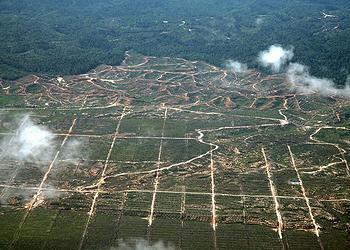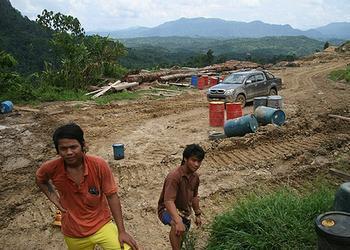
from ENS
Malaysia is about to require a higher concentration of palm oil in its biodiesel fuel blend, government and industry and sources said last week.
The new B7 biofuel blend would increase the palm oil component of biodiesel to seven percent, up from the current five percent.
Adding more palm oil to the blend increases the pressure to convert rainforest lands to oil palm plantations, putting indigenous communities and wildlife, including the critically endangered orangutan, at risk.
“So far the direction from the ministry is quite clear. We’re really moving to B7,” an official from the Malaysian Biodiesel Association told the online news service Malaysian Insider.
He declined to be named as the discussions were held behind closed doors. Another government official, who also declined to be named, said Malaysia is working out final issues with car manufacturers before implementing the new requirement.
They indicated that the B7 blend could be in place as early as December in Malaysia, the world’s second-largest palm oil producer.
Indonesia, the world’s top palm oil producer, recently announced plans to raise its own minimum mandatory biofuel requirement for biodiesel to 10 percent, up from a range of three to 10 percent.
Clearing and burning of rainforests for palm oil plantations is one of the primary drivers of deforestation in Southeast Asia, and is one of the major reasons Indonesia is the world’s third largest global warming polluter, just behind China and the United States.

At the same time, the Malaysian government is writing a new global standard for its palm oil to ensure quality and address concerns of nongovernmental organizations.
Plantation Industries and Commodities Minister Datuk Douglas Uggah Embas said the government is in the final stages of drawing up the Malaysian Sustainable Palm Oil (MSPO)certification to improve standards and the image of locally produced palm oil products.
Speaking at the opening of the Malaysia International Commodity Conference and Showcase at the Malaysia Agro Exposition Park in Serdang on Sunday, he said the move is in line with Malaysia’s leading global role as a palm oil producer.
Douglas said MSPO certification takes into account 60 local laws, including environment and wildlife legislation along with other state laws.
As an example of local rules already in place, he mentioned open burning to clear palm oil plantations. This practice is prohibited by the Department of Environment on Peninsular Malaysia while it is allowed but regulated in Sarawak.
The minister is currently the Member of the Malaysian Parliament for the Betong constituency in Sarawak, where the oil palm industry is big business.
Douglas said many foreign nongovernmental organizations insist markets only buy palm oil which meets standards set out by the Roundtable on Sustainable Palm Oil but their criteria is too expensive for Malaysian smallholders.
He said the government’s MSPO certification requirements will include best agriculture practices and will ensure smallholders will not be at a disadvantage.
At the same time, the MSPO will address the impact of the palm oil industry on the Orang Asli indigenous minority peoples of Peninsular Malaysia, deforestation, lost of biodiversity and the impact on wildlife including the orangutan.
Douglas said the MSPO certification would be brought to the cabinet for approval within the year and before a decision is made on whether it will be made mandatory or voluntary.

The 2014 BMW M550d xDrive is powered by a diesel engine. Biodiesel can be used in any diesel engine without modification. (Photo courtesy BMW)
At the same time as Malaysia and Indonesia are raising the palm oil concentration in their biodiesel, Europe’s drivers are filling their tanks with increasing amounts of palm oil, and reliance on the controversial biofuel is set to rise even further.
A study conducted by the International Institute for Sustainable Development for Friends of the Earth Europe released in September finds that Europe’s use of palm oil for automotive fuel has increased much more than predicted and now stands at 20 percent of the biodiesel mix.
The EU consumes 40 percent more palm oil – for fuel, food and cosmetics – today compared to six years ago, despite continual warnings about the unsustainability of palm oil expansion.
The EU and many other countries introduced biofuel subsidies to facilitate the transition from fossil fuels to more sustainable fuels in transport, reduce greenhouse gas emissions, and support jobs in the agricultural sector.
But there remain some “information gaps and blind spots” that impede informed decision making on EU biofuel policies, the IISD report finds. One of these blind spots has been the impact of the EU biofuel policies on palm oil consumption patterns.
On the EU-27 scale, the biofuels industry has increased its use of palm oil by 365 percent over 2006–2012, from 0.4 to 1.9 million tonnes per year.
The IISD report states, “The additional demand can be linked primarily to the growth in biodiesel production stimulated by government policies during the same period.
Copyright Environment News Service (ENS) 2013. All rights reserved.

